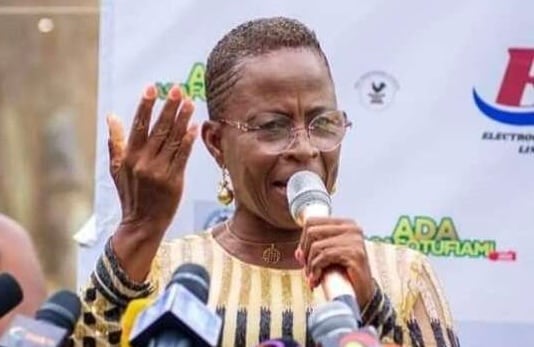The upcoming by-election in Akwatia has become a stage for a fierce political battle between the ruling National Democratic Congress (NDC) and the opposition New Patriotic Party (NPP). Comfort Doyoe Cudjoe, the Deputy Majority Chief Whip and Member of Parliament for Ada, has launched a strong appeal to the constituents of Akwatia, urging them to reject the NPP candidate, Solomon Kwame Asumadu, and instead throw their support behind the NDC’s candidate, Lawyer Bernard Bediako Baidoo. Her central argument revolves around the NPP’s parliamentary conduct, which she characterizes as obstructive and unproductive, contrasting it with the NDC’s purported focus on development and delivering tangible benefits to their constituencies.
Cudjoe’s critique centers on the NPP’s frequent use of press conferences and walkouts as their primary mode of operation in Parliament. She argues that these tactics, while perhaps attracting attention, do not translate into concrete improvements for the people of Akwatia. She portrays the NPP’s actions as a deliberate strategy to disrupt parliamentary proceedings and distract from the NDC’s development agenda. By voting for the NPP candidate, Cudjoe warns the constituents of Akwatia, they would essentially be endorsing this disruptive behavior and hindering the progress of their own constituency.
Conversely, Cudjoe champions the NDC’s approach, emphasizing their commitment to development and their active engagement in securing projects and resources for their constituencies. She points to ongoing efforts by NDC MPs to bring tangible benefits to their constituents, highlighting this as evidence of their dedication to improving the lives of the people they represent. This, she argues, stands in stark contrast to the NPP’s alleged preoccupation with political posturing and grandstanding.
The underlying message in Cudjoe’s appeal is a call for pragmatic politics, urging the people of Akwatia to choose a representative who will actively work for their betterment rather than one who engages in symbolic displays of dissent. She frames the choice as one between effective representation and political theatrics, with the NDC representing the former and the NPP the latter. She implores the voters to consider the practical implications of their choice and to prioritize tangible development over political maneuvering.
The by-election in Akwatia thus becomes a referendum on the role and responsibility of elected officials. Should they be agents of change, actively working within the system to deliver improvements to their constituencies? Or should they primarily serve as voices of opposition, challenging the ruling party through public displays of dissent? Cudjoe clearly advocates for the former, urging the voters of Akwatia to choose a representative who will prioritize their needs and contribute to the development of their community.
Ultimately, the decision rests with the voters of Akwatia. They must weigh the arguments presented by both sides and decide which candidate best represents their interests and aspirations. Will they heed Cudjoe’s call and opt for the NDC’s promise of development and tangible benefits? Or will they choose the NPP, despite their perceived focus on political theatrics? The by-election will undoubtedly serve as a crucial indicator of the prevailing political sentiment in the constituency and offer insights into the broader political landscape of Ghana.














